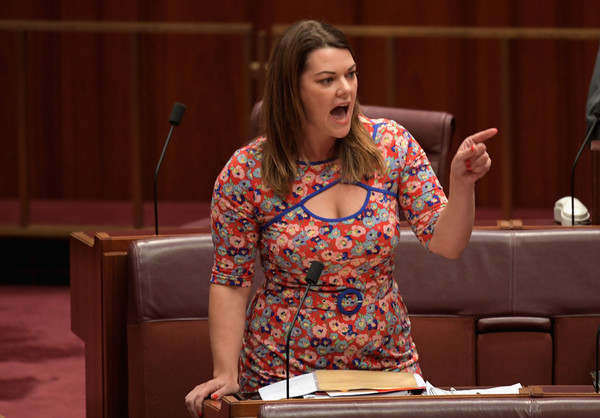Senator Sarah Hanson-Young.
Labor has attacked the federal government for five and a half years of inaction over screen sector reforms while the Australian Greens have advocated a suite of measures to support the industry.
The Greens urged the government to impose a local content quota of at least 10 per cent on streaming services, harmonise the Producer Offset at 40 per cent and raise the Location Offset to 30 per cent.
The removal of the 65-hour cap for the Producer Offset, closing the New Zealand content ‘loophole,’ maintaining the existing content quota system and establishing terms of trade between broadcasters and producers were among the Greens’ proposals – all policies advocated by Screen Producers Australia.
Labor Senators accused the government of failing to articulate an agenda or vision for the Australian screen and music sectors and of cutting funding for public broadcasting by about $500 million.
They called on the government to ensure appropriate Australian content quotas and expenditure requirements, which are vital in fostering Australian production and promoting Australian stories, including children’s content.
Both parties stated their cases in the Senate Committee on Environment and Communications’ report into Australian content on broadcast, radio and streaming services, which was tabled on Tuesday.
Australian Children’s Television Foundation CEO Jenny Buckland criticised the committee chaired by Greens Senator Sarah Hanson-Young for stopping short of making concrete policy proposals.
The report merely recommended the correct policy settings to support the growth and future of the Australian screen industry, including a framework of broadcast content quotas, fair terms of contract and government incentives.
“I think the report shows that support for Australian content is a motherhood kind of concept – everyone wants to say good things about it – but at the end of the day they couldn’t come together and agree on what to do about any of the challenges,” she tells IF.
“Meanwhile, the issues keep getting more and more complex and grappling with how we regulate the FANGS (Facebook, Amazon, Netflix and Google) is presumably the biggest issue for the communications portfolio going forward.”
Screen Producers Australia CEO Matt Deaner welcomed the Greens’ proposals, noting: “SPA has long been a proponent of these positions, which not only mirror original policy intents but are all needed to curb the rise of production costs, changes in TV viewer habits as well as changes in distribution and release models for feature film.
“These recommendations serve as timely reminders of the value of the diversity of Australian content, despite efforts to see parts of our content quota system reduced or abolished.
“We also welcome the additional comments by Labor Senators and the acknowledgement of the need for policy and regulatory reform for over-the-top services. We trust these will be expanded into fully formed policy positions by Labor in the near future.”
Labor Senators reiterated their criticism of Minister for Communications and the Arts Mitch Fifield’s refusal to release the Australian and Children’s Screen Content Review and failing to respond to the Coalition-majority House of Representatives inquiry into the growth and sustainability of the Australian film and TV industry.
Australian Directors’ Guild CEO Kingston Anderson welcomed the Senate committee report’s recommendations and the House of Reps’ report last year, stating: “We hope that both the government and opposition will take heed of the findings of these government reports and will support Australian stories in their screen policies at the coming election.”
In its submission to the inquiry Netflix argued against a quota, pointing to its investment in original movies, documentaries, series and co-productions such as Tidelands, White Rabbit Project, Tales by Light, Wanted, Pacific Heat, The Letdown, Cargo and Pine Gap.
The streaming giant also cited its second-run Australian titles such as Lion, Rake, Ms Fisher’s Murder Mysteries, Barbecue, Outback Truckers, The Code and The Moodys, stating this distribution model provides an additional way for Australian producers to monetise content and creates opportunities for viewers around the world to access Australian content.


